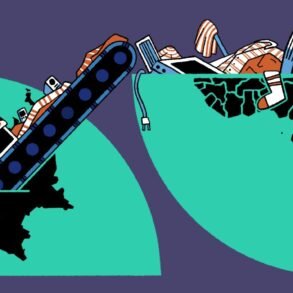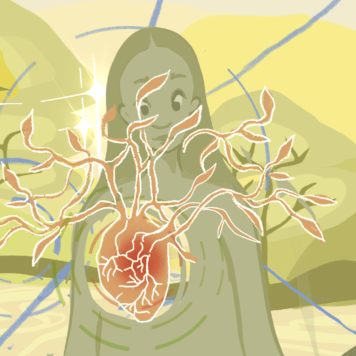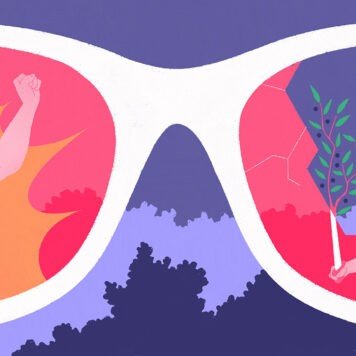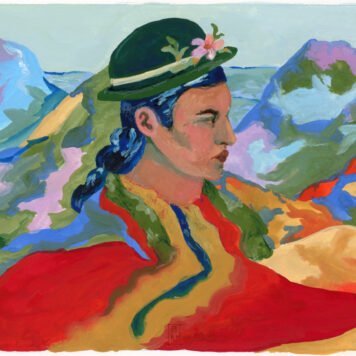As the daughter of a multigenerational lineage of farmers, and raised in a primarily agricultural P’urhepecha descendant community in Michoacan, Mexico, I experienced a close relationship with my food and where my food came from from a young age. Migrating back to the so-called United States was a drastic emotional, physical and cultural shift that disrupted my relationship with food and land, something I didn’t realise and only began addressing until almost a decade after our last migration North.
As we see a slow but steady shift towards locally sourced and small-scale farming in the United States, I can’t help but notice how many of these “alternative” farmers are so far removed from the farmers in my community fighting everyday against destructive neoliberal food policies to keep their land and their ability to sustain themselves. As a racialized woman, white farmers in the United States feel disconnected to me both in terms of their knowledge and the absence of their relationships with social movements led by Indigenous farmers across the world. But why is that? The team of A Growing Culture answers just that.
A Growing Culture (AGC) unites to reclaim agency over our foodways. They are working towards a future of food sovereignty. For everyone. Everywhere. I was able to speak to three members from the collective, Justin Sardo, Media Director, Thea Walmsley, Communications Director, and Dimah Mahmoud, Programs Director.

During our conversation, Thea Walmsley states that audiences in the West are particularly disconnected from non-western Indigenous farmers’ social movements because of their unfamiliarity with the concept of sovereignty. “What does sovereignty mean, if you have never had your sovereignty taken from you?” Thea inquires during our interview. This is a particularly important question when thinking about farming in the U.S and the crucial differences between a food justice system versus food sovereignty. Food justice focuses on addressing systemic barriers for accessing healthy and nutritious food. However, food sovereignty allows for communities, in particular Indigenous communities, to decide which food and systems are culturally relevant to sustain their communities. They have choice, rather than working to reform a system that was never meant to work for them. As defined by AGC, food sovereignty means liberation by farmers for farmers. In the infamous words by Emiliano Zapata, “La tierra es de quien la trabaja / “The land belongs to those who work it with their own hands.”
All over the world, from farmers in India and Mexico, to the Philippines we have witnessed and continue to witness uprisings of farmers that have the ability to strike fear in the hearts of the most powerful agricultural corporations in the world. So, why are farmers in the United States not achieving the same amount of attention and creating this kind of power shift that we see in other countries around the world?? According to Justin Sardo from AGC,
“Fear of farmers feels a lot more distant in the [United] States, than it does elsewhere in the world. Most of the largest social movements of the world are peasant led, Indigenous led movements that are focused on reclaiming food ways, because most countries are largely agriculturally focused. That is just something we don’t get because we [in the U.S] have so few farmers, and most of them I think we could argue are more corporation-like than traditional farmers. Then we have this split between farmers and farmworkers, which at its heart is about land ownership.”
Once again the conversation returns to the fact that in order for food sovereignty to exist land must be given back to Indigenous farmers who steward and work the land. Agricultural corporations are not going to return land voluntarily because they understand the implications Indigenous land ownership has in upholding our current oppressive systems. The system has been designed this way since the birth of capitalist and settler-colonial states. As Justin explains it, “the elites and people who wanted to claim power and control recognised that it needed to start with lands, and control of land and resources’, or in summary, disconnecting “people from communally steward subsistence based practices”.
Although in order for the food sovereignty movement to remain rooted in self-determination it must be led by Indigenous farmers, we all have a role to play given our inherent connections to food systems and dependency on farmers for our survival. In order for the movement to grow farmers need visibility and strength in numbers. Which is precisely why the U.S agricultural system wants you to feel disconnected from your food and those who bring food to your table. According to Dimah Mahmoud from AGC, “I don’t think people see farmers…they are here, they have always been here…the world is just not listening to them. They are not listening not because the farmers are voiceless, but because the farmers are being silenced, actively silenced and actively pushed out of the frame”.
Dimah’s work focuses on cultural heritage, heritage preservation, and endangered languages revitalisation. As a Nubian woman, she has witnessed how the development of dams in her community has led to displacement of her people, partial loss of sovereignty over their land, andalso parts of their language. Which shows that alongside accessing land, the food sovereignty movement is fueled by culture and human relationships. As Dimah mentioned in our conversation, “culture is something that threatens power, because culture emanates truth, it emphasises spirituality. Culture links back to everything being connected, and that goes against everything the system is designed to keep us isolated from one another”.
Reconnecting with my Indigenous ancestors and P’urhepecha culture is precisely what has given me the tools to heal from the colonial trauma my community has experienced. Cultural heritage is the framework from which I understand that my family’s history of growing sugarcane, corn, and more recently avocados, is about more than about feeding our bodies. It’s about measuring time based on the harvesting season, it’s part of our spiritual history of making offerings to the land, and about being self-sustaining. My father and his lineage of farmers transitioned from this world before seeing liberation for our land and our people. But there are enough seeds planted in my spirit and around me that I believe one day my people alongside all Indigenous farmers will know what it’s like to live in sovereignty.
AGC is an organization that is serving as a vessel for food sovereignty to flourish. The team’s commitment to farmers’ self-determination and farmer research-led solutions is what allows for this organization to be fluid against the rigid constraints of the non-profit industrial complex. AGC’s work will one day be “redundant” in the words of Justin, for in that moment farmers will see liberation across all parts of our food system. Growth and culture can be defined in a multitude of ways, but in the closing words of Dimah, here is how she defines growth: “To grow by unlearning, to grow by learning, to grow by challenging, by holding ourselves accountable, inviting others to hold themselves accountable, to grow by asking questions, to grow by provoking questions (should this be answers?), to grow by radical love, by solidarity, in every way we can grow culture and be a culture of growing”.










